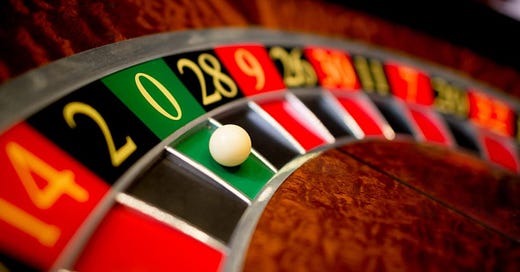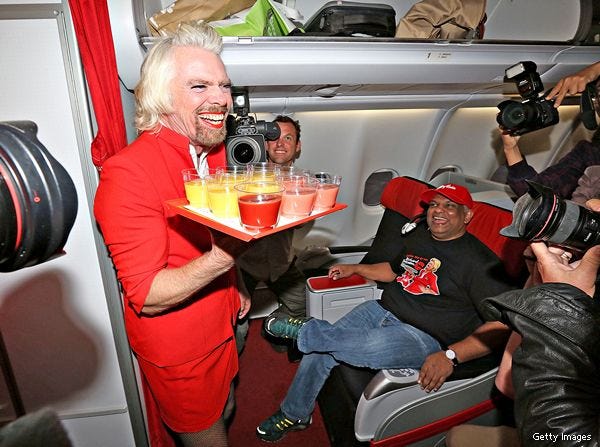I’m no stranger to a casino. An embarrassing proportion of my time at University was spent beside a roulette wheel. I’d love to tell you I cleaned the place out- sadly not. I may as well have stood in the corner setting fire to bank notes.
Excessive drinking, regular drug taking, and compulsive gambling- Not my finest years.
Welcome new readers! If you’re reading this but haven’t subscribed you can subscribe here:
Risk Seeking
The above might not sound like a great pedigree for running a startup- irresponsible gambles can be fatal. But I actually see my University days as a great primer. They changed the way I see risk.
When it comes to complex systems we’re really not great at assessing risk. A startup is a very complex system. With such high odds of failure you’d think risks must be avoided wherever necessary. In fact the opposite is true. Risks must be taken.
An entrepreneurial endeavour is a leap into the unknown. It’s an effort to reimagine how a corner of the world works. Play it safe and you end up standing still. Stand still and you never get off the ground. The products and companies that truly innovate are bold. They take swing after swing, and every now and again one connects.
Avoiding risks comes with its own risks. Whilst the initial risk might be avoided what we don’t see is the downside brought about by stagnation. Going up in flames is replaced by slowly drowning.
Safe to Fail
You’re probably skeptical. Why’s a former gambling addict lecturing me about risk?
I don’t blame you. But all risk is not made equal. The mindless gambling of my University days was foolish and fruitless risk. I’m certainly not suggesting the fledging startup stakes their payroll at the poker table. It’s a game I was destined to lose- when I won all I got was some money, and excitement, both of which were gone by the next morning. When I lost not only did I lose money, I had nothing to show for it.
The key is not to simply take risks, it’s to take the right risks.
Taking the right risks really isn’t risky. Launching a startup is a great example- the downside is you lose some money and have the richest learning experience of your life. The upside? Near limitless. Not a bad trade off.
By viewing it as a learning experience you’re making it safe to fail. If you learn when you win, you learn when you lose, and your goal is to learn- then you never really lose.
Richard Branson’s a maestro at capping his downside. When he started Virgin Airlines he had a deal with Boeing so that if it didn’t workout after a year they’d buy the plane back. He made it safe to fail.
The trick is to figure out how to keep playing no matter what- no matter how many balls you miss. Then you’re free to truly innovate.
Win-Win
Even those bad loses- the “lose the house” kind- can be reframed as a win. As a money making exercise my casino trips were an abject failure, but that doesn’t mean they haven’t been a net-positive on my life today.
I f**ked up so much in my teens and early 20s. Honestly, like you wouldn’t believe. For the best part of a decade I got it wrong again and again and again. But then I started getting it less wrong. I started reading more and applying myself at work. The drinking stopped (along with the drugs and gambling), I got into meditation. The result? Today I can truly say I’m happy. The days are filled with joy and I don’t feel anything is missing in my life. I’m content.
There’s no chance I would have reached this point if it wasn’t for the dark days. I would have settled: Settled for a job I didn’t enjoy, or an unhealthy lifestyle that left me deflated. But it was only by getting it as wrong as I did that I gained the motivation to build the life I wanted. For that, I’m grateful.
Everyday’s a gamble. But what if we win whatever the dice shows? Wouldn’t that be something.
My Week in Books📚
Chaos by James Gleick
The emerging science of chaos. Over my head in parts but a glimpse at just how little me still understand about the world around us. There is order in chaos; a profound idea.
Slack by Tom DeMarco
The case for slack. Today there’s such a push for “efficiency”, this wonderfully highlights the point that efficiency comes with its issues. Being effective is what matters, yet efficiency ironically gets in the way of this. Introduce some slack into the system.
I’ll be updating the books I’ve read this year here. Any recommendations? Let me know!
A Final Thought 💡
“Life is inherently risky. There is only one big risk you should avoid at all costs, and that is the risk of doing nothing.”
- Dennis Waitley





